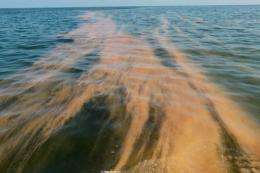BP relaunches subsea dispersant operations

BP restarted Monday operations to stream dispersants directly into the main Gulf of Mexico oil leak despite fears the chemicals could themselves be harmful to the environment.
A mile-long tube was fed down to the leaking pipe on the sea floor and directly shot the dispersant into the flow, guided by remotely-operated robotic submarines.
State and federal agencies "consented to the third test today of subsea dispersant," BP spokesman John Curry told AFP.
The test began at 4:30 am (0930 GMT) "and will continue for 24 hours. After the test is concluded, further evaluations will be conducted," said Curry.
The dispersant is meant to break down the oil so that, over time, the slick is reduced to smaller particles that biodegrade instead of being left as chunky, thick globs that can choke both wildlife and vegetation.
Critics however say the dispersant causes just as many problems as it solves, and affects undersea life from the smallest microorganism on up.
"We are continuing to deploy dispersant at the seabed. It seems to be having a significant impact," said BP CEO Tony Hayward.
"We have an armada of ships, as you know, on the surface engaged in major skimming activity. That is proving to be pretty effective. We've skimmed of the order of 100,000 barrels of oily water," Hayward said.
"And we have an air force of planes deploying dispersants, and we're also conducting, as you know, controlled burns, and that -- the activity on the surface is going a very long way to containing the spill in the far offshore."
Louisiana State University scientists will study underwater and surface samples of the dispersant impact on the oily water mixture, Curry said.
Meanwhile, US Environmental Protection Agency administrator Lisa Jackson traveled to the gulf region on a two-day visit "to oversee efforts to mitigate the environmental and human health impact of the ongoing BP oil spill," the EPA said in a statement.
Jackson will be seeking "a thorough scientific assessment" of the spill’s impact on the region, and will meet with scientists, "to discuss the potential impact of the use of dispersants on the spill on and below the surface of the water," among other things.
Environmentalists, shrimpers and fishers worry that the dispersant will kill fish and other organisms in the seafood chain.
The Southern Shrimp Alliance, a group representing the US wild-caught shrimping industry, said it welcomed news that the National Oceanic and Atmospheric Administration (NOAA) is testing seafloor samples around the Deepwater Horizon oil spill.
"The unprecedented use of dispersants, which are toxic to shrimp and young marine life, is very concerning," said Executive Director John Williams said in a statement.
"The widespread dumping of dispersants... on the surface of the water and deep in the Gulf of Mexico near the source of the oil spill is an unprecedented and risky response that may be more damaging than the oil itself."
The dispersant chemicals "relocate the oil from the shores to the water column where it will be spread by currents to vital reproductive grounds throughout the western Gulf of Mexico," Williams said.
"As shrimpers, we live on the sea and are fighting to preserve the delicate balance of the ocean," he added.
The oil has been gushing for more than two weeks, since the BP-leased Deepwater Horizon rig sank some 80 km (50 miles) southeast of Venice, Louisiana on April 22, two days after an explosion that killed 11 workers.
(c) 2010 AFP




















